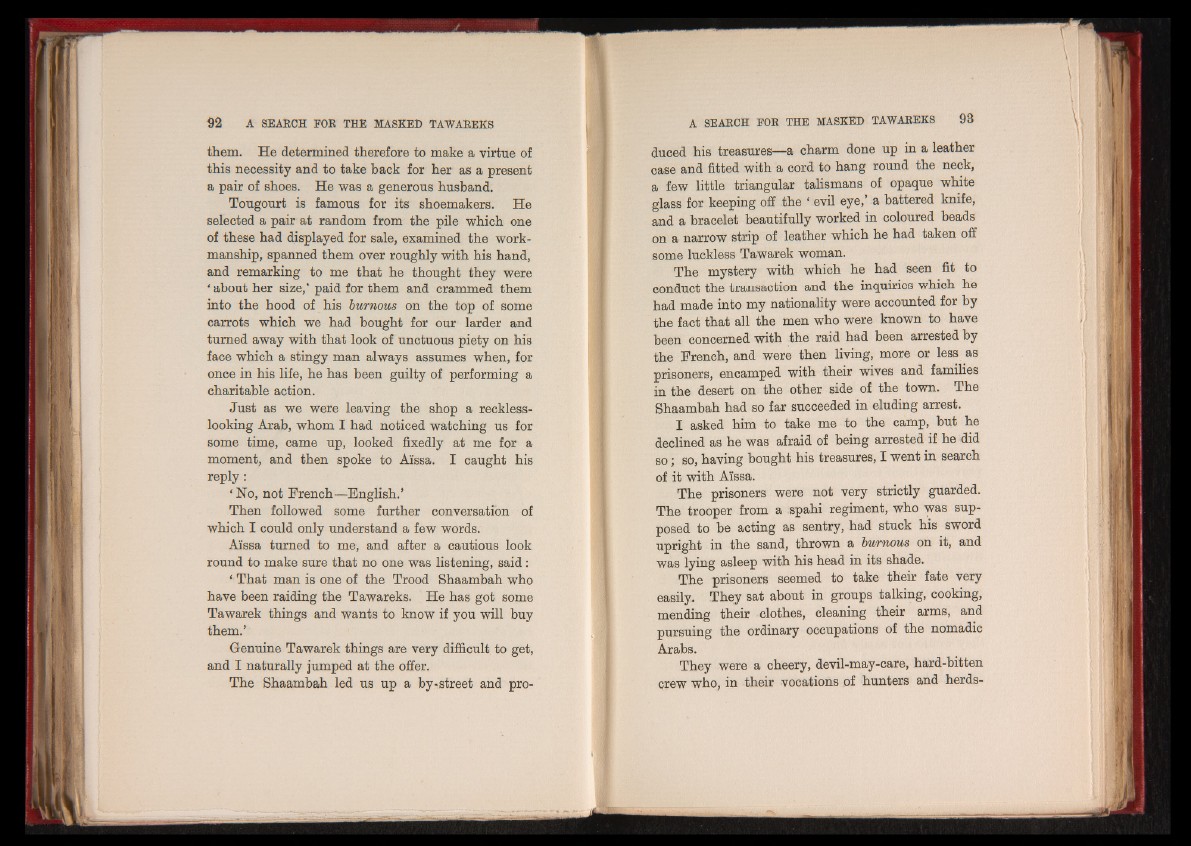
them. He determined therefore to make a virtue of
this necessity and to take back for her as a present
a pair of shoes. He was a generous husband.
Tougourt is famous for its shoemakers. He
selected a pair at random from the pile which one
of these had displayed for sale, examined the workmanship,
spanned them over roughly with his hand,
and remarking to me that he thought they were
‘ about her size,’ paid for them and crammp.fi them
into the hood of his burnous on the top of some
carrots which we had bought for our larder and
turned away with that look of unctuous piety on his
face which a stingy man always assumes when, for
once in his life, he has been guilty of performing a
charitable action.
Just as we were leaving the shop a reckless-
looking Arab, whom I had noticed watching us for
some time, came up, looked fixedly at me for a
moment, and then spoke to Aissa. I caught his
reply :
‘ No, not French—English.’
Then followed some further conversation of
which I could only understand a few words.
Aissa turned to me, and after a cautious look
round to make sure that no one was listening, said :
* That man is one of the Trood Shaambah who
have been raiding the Tawareks. He has got some
Tawarek things and wants to know if you will buy
them.’
Genuine Tawarek things are very difficult to get,
and I naturally jumped at the offer.
The Shaambah led us up a by-street and produced
his treasures—a charm done up in a leather
case and fitted with a cord to hang round the neck,
a few little triangular talismans of opaque white
glass for keeping off the ‘ evil eye,’ a battered knife,
and a bracelet beautifully worked in coloured beads
on a narrow strip of leather which he had taken off
some luckless Tawarek woman.
The mystery with which he had seen fit to
conduct the transaction and the inquiries which he
had made into my nationality were accounted for by
the fact that all the men who were known to have
been concerned with the raid had been arrested by
the French, and were then living, more or less as
prisoners, encamped with their wives and families
in the desert on the other side of the town. The
Shaambah had so far succeeded in eluding arrest.
I asked him to take me to the camp, but he
declined as he was afraid of being arrested if he did
so; so, having bought his treasures, I went in search
of it with Aissa.
The prisoners were not very strictly guarded.
The trooper from a spahi regiment, who was supposed
to be acting as sentry, had stuck his sword
upright in the sand, thrown a burnous on it, and
was lying asleep with his head in its shade.
The prisoners seemed to take their fate very
easily. They sat about in groups talking, cooking,
mending their clothes, cleaning their arms, and
pursuing the ordinary occupations of the nomadic
Arabs.
They were a cheery, devil-may-care, hard-bitten
crew who, in their vocations of hunters and herds